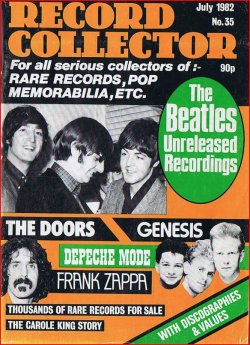Depeche Mode
[Record Collector, July 1982, Words: Richard Jackson. Picture: Uncredited.]
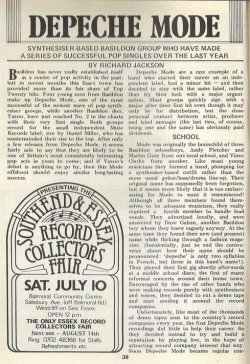
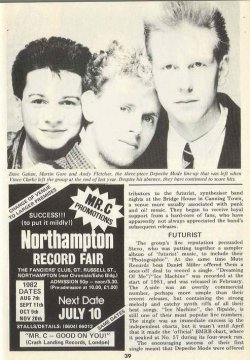
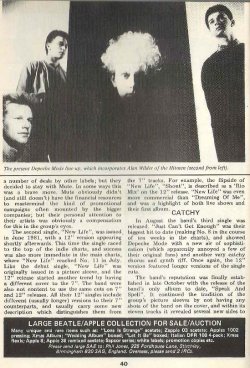
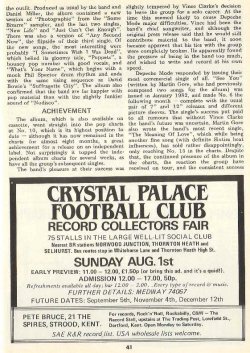
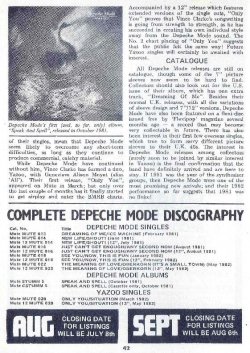
RECORD COLLECTOR, JULY 1982
Basildon has never really established itself as a centre of pop activity in the past; but in recent months this Essex town has provided more than its fair share of Top Twenty hits. Four young men from Basildon make up Depeche Mode, one of the most successful of the newest wave of pop synthesiser groups, while another Basildon duo, Yazoo, have just reached No.2 in the charts with their very first single. Both groups record for the small independent Mute Records label, run by Daniel Miller, who has masterminded their rise to the top. After only a few releases from Depeche Mode, it seems fairly safe to say that they are likely to be one of Britain's most consistently interesting pop acts in years to come; and if Yazoo's debut is anything to go by, then this Mode offshoot should enjoy similar long-lasting success.
Depeche Mode are a rare example of a band who started their career on an independent label, had a minor hit - and then decided to stay with the same label, rather than try their luck with a major organisation. Most groups quickly sign with a major after their first hit even though it may only be for distribution, but the close personal contact between artist, producer and label manager (the last two, of course, being one and the same) has obviously paid dividends.
SCHOOL
Mode was originally the brainchild of three Basildon schoolboys, Andy Fletcher and Martin Gore from one local school, and Vince Clarke from another. Like most young musicians they formed a band, plumping for a synthesiser-based outfit rather than the more usual guitar / bass / drums line-up. Their original name has supposedly been forgotten, but it seems more likely that it is too embarrassing for Mode to want it remembered! [1] Although all three members found themselves to be adequate musicians, they really required a fourth member to handle lead vocals. They advertised locally, and were answered by Dave Gahan, another Basildon boy whom they knew vaguely anyway. [2] At the same time they found their new (and present) name while flicking through a fashion magazine. (Incidentally, just to end the controversy about how their name should be pronounced: 'depeche' is only two syllables in French, but three in this band's name!). [3] They played their first gig shortly afterwards at a middle school disco, the first of many informal concerts around their home town. Encouraged by the rise of other bands who were making records purely with synthesisers and voices, they decided to cut a demo tape and start sending it around the record companies.
Unfortunately, like most of the thousands of demo tapes sent to the country's record companies every year, the first Depeche Mode recordings did little to help their career. So they decided instead to try and build a reputation by playing live, in the hope of attracting record company interest that way. Soon Depeche Mode became regular contributors to the futurist, synthesiser band nights at the Bridge House in Canning Town, a venue more usually associated with punk and oi! music. They began to receive loyal support from a hard-core of fans, who have apparently not always appreciated the band's subsequent releases.
FUTURIST
The group's live reputation persuaded Stevo, who was putting together an album of 'futurist' music, to include their "Photographic". At the same time Mute Records boss Daniel Miller offered them a once-off deal to record a single. "Dreaming Of Me" / "Ice Machine" was recorded at the start of 1981, and was released in February. The A-side was an overtly commercial number, perhaps more simple than their recent releases, but containing the strong melody and catchy synth riffs of all their best songs. "Ice Machine", the flipside, is still one of their most popular live numbers. The single was an immediate success in the independent charts, but it wasn't until April that it made the 'official' BMRB chart, where it peaked at No. 57 during its four-week run.
The encouraging success of their first single meant that Depeche Mode were offered a number of deals by other labels; but they decided to stay with Mute. In some ways this was a brave move. Mute obviously didn't (and still doesn't) have the financial resources to mastermind the kind of promotional campaigns often mounted by the bigger companies; but their personal attention to their artists was obviously a compensation for this in the group's eyes.
The second single, "New Life", was issued in June 1981, with a 12" version appearing shortly afterwards. This time the single raced to the top of the indie charts, and success was also more immediate in the main charts, where "New Life" reached No. 11 in July. Like the debut single, "New Life" was originally issued in a picture sleeve, and the 12" release started another trend by having a different cover to the 7". The band were also not content to use the same cuts on 7" and 12" releases. All their 12" singles include different (usually longer) versions to their 7" counterparts, and usually carry some new description which distinguishes them from the 7" tracks. [4] For example, the flipside of "New Life", "Shout", is described as a 'Rio Mix' on the 12" release. "New Life" was even more commercial than "Dreaming Of Me", and was a highlight of both live shows and their first album.
CATCHY
In August the band's third single was released. "Just Can't Get Enough" was their biggest hit to date (making No. 8 in the course of ten weeks in the charts), and showed Depeche Mode with a new air of sophistication (which apparently annoyed a few of their original fans) and another very catchy chorus and synth riff. Once again, the 12" version featured longer versions of the single cuts.
The band's reputation was finally established in late October with the release of the band's only album to date, "Speak And Spell". It continued the tradition of the group's picture sleeves by not having any shots of the band on the cover [5], and within its eleven tracks it revealed several new sides to the outfit. Produced as usual by the band and Daniel Miller, the album contained a new version of "Photographic" from the "Some Bizarre" sampler, and the last two singles, "New Life" and "Just Can't Get Enough". There was also a version of "Any Second Now", the flipside of their third single. Of the new songs, the most interesting were probably "I Sometimes Wish I Was Dead", which belied its gloomy title, "Puppets", a bouncy pop number with good vocals, and "What's Your Name", which begins with a mock Phil Spector drum rhythm and ends with the same rising sequence as David Bowie's "Suffragette City". The album also confirmed that the band are far happier with pop material than with the slightly funkier sound of "Nodisco".
[Record Collector, July 1982, Words: Richard Jackson. Picture: Uncredited.]
Remarkably savvy article combining the band's early history with a focus on the formats of their releases, and a discography (scanned but not transcribed here). A very readable account of their formation and early years, with plenty of spookily accurate predictions of the band's future.
" After only a few releases from Depeche Mode, it seems fairly safe to say that they are likely to be one of Britain's most consistently interesting pop acts in years to come. "
Summary: Remarkably savvy article combining the band's early history with a focus on the formats of their releases, and a discography (scanned but not transcribed here). A very readable account of their formation and early years, with plenty of spookily accurate predictions of the band's future. [1738 words]
This article is part of the Newcomer's Trail





RECORD COLLECTOR, JULY 1982
Basildon has never really established itself as a centre of pop activity in the past; but in recent months this Essex town has provided more than its fair share of Top Twenty hits. Four young men from Basildon make up Depeche Mode, one of the most successful of the newest wave of pop synthesiser groups, while another Basildon duo, Yazoo, have just reached No.2 in the charts with their very first single. Both groups record for the small independent Mute Records label, run by Daniel Miller, who has masterminded their rise to the top. After only a few releases from Depeche Mode, it seems fairly safe to say that they are likely to be one of Britain's most consistently interesting pop acts in years to come; and if Yazoo's debut is anything to go by, then this Mode offshoot should enjoy similar long-lasting success.
Depeche Mode are a rare example of a band who started their career on an independent label, had a minor hit - and then decided to stay with the same label, rather than try their luck with a major organisation. Most groups quickly sign with a major after their first hit even though it may only be for distribution, but the close personal contact between artist, producer and label manager (the last two, of course, being one and the same) has obviously paid dividends.
SCHOOL
Mode was originally the brainchild of three Basildon schoolboys, Andy Fletcher and Martin Gore from one local school, and Vince Clarke from another. Like most young musicians they formed a band, plumping for a synthesiser-based outfit rather than the more usual guitar / bass / drums line-up. Their original name has supposedly been forgotten, but it seems more likely that it is too embarrassing for Mode to want it remembered! [1] Although all three members found themselves to be adequate musicians, they really required a fourth member to handle lead vocals. They advertised locally, and were answered by Dave Gahan, another Basildon boy whom they knew vaguely anyway. [2] At the same time they found their new (and present) name while flicking through a fashion magazine. (Incidentally, just to end the controversy about how their name should be pronounced: 'depeche' is only two syllables in French, but three in this band's name!). [3] They played their first gig shortly afterwards at a middle school disco, the first of many informal concerts around their home town. Encouraged by the rise of other bands who were making records purely with synthesisers and voices, they decided to cut a demo tape and start sending it around the record companies.
Unfortunately, like most of the thousands of demo tapes sent to the country's record companies every year, the first Depeche Mode recordings did little to help their career. So they decided instead to try and build a reputation by playing live, in the hope of attracting record company interest that way. Soon Depeche Mode became regular contributors to the futurist, synthesiser band nights at the Bridge House in Canning Town, a venue more usually associated with punk and oi! music. They began to receive loyal support from a hard-core of fans, who have apparently not always appreciated the band's subsequent releases.
FUTURIST
The group's live reputation persuaded Stevo, who was putting together an album of 'futurist' music, to include their "Photographic". At the same time Mute Records boss Daniel Miller offered them a once-off deal to record a single. "Dreaming Of Me" / "Ice Machine" was recorded at the start of 1981, and was released in February. The A-side was an overtly commercial number, perhaps more simple than their recent releases, but containing the strong melody and catchy synth riffs of all their best songs. "Ice Machine", the flipside, is still one of their most popular live numbers. The single was an immediate success in the independent charts, but it wasn't until April that it made the 'official' BMRB chart, where it peaked at No. 57 during its four-week run.
The encouraging success of their first single meant that Depeche Mode were offered a number of deals by other labels; but they decided to stay with Mute. In some ways this was a brave move. Mute obviously didn't (and still doesn't) have the financial resources to mastermind the kind of promotional campaigns often mounted by the bigger companies; but their personal attention to their artists was obviously a compensation for this in the group's eyes.
The second single, "New Life", was issued in June 1981, with a 12" version appearing shortly afterwards. This time the single raced to the top of the indie charts, and success was also more immediate in the main charts, where "New Life" reached No. 11 in July. Like the debut single, "New Life" was originally issued in a picture sleeve, and the 12" release started another trend by having a different cover to the 7". The band were also not content to use the same cuts on 7" and 12" releases. All their 12" singles include different (usually longer) versions to their 7" counterparts, and usually carry some new description which distinguishes them from the 7" tracks. [4] For example, the flipside of "New Life", "Shout", is described as a 'Rio Mix' on the 12" release. "New Life" was even more commercial than "Dreaming Of Me", and was a highlight of both live shows and their first album.
CATCHY
In August the band's third single was released. "Just Can't Get Enough" was their biggest hit to date (making No. 8 in the course of ten weeks in the charts), and showed Depeche Mode with a new air of sophistication (which apparently annoyed a few of their original fans) and another very catchy chorus and synth riff. Once again, the 12" version featured longer versions of the single cuts.
The band's reputation was finally established in late October with the release of the band's only album to date, "Speak And Spell". It continued the tradition of the group's picture sleeves by not having any shots of the band on the cover [5], and within its eleven tracks it revealed several new sides to the outfit. Produced as usual by the band and Daniel Miller, the album contained a new version of "Photographic" from the "Some Bizarre" sampler, and the last two singles, "New Life" and "Just Can't Get Enough". There was also a version of "Any Second Now", the flipside of their third single. Of the new songs, the most interesting were probably "I Sometimes Wish I Was Dead", which belied its gloomy title, "Puppets", a bouncy pop number with good vocals, and "What's Your Name", which begins with a mock Phil Spector drum rhythm and ends with the same rising sequence as David Bowie's "Suffragette City". The album also confirmed that the band are far happier with pop material than with the slightly funkier sound of "Nodisco".

